|
Try as we all might (and it's quite likely we all don't), it's hard not to get a prejudicial twinge about some films even before you see them, based on knowledge of who the director or even lead actor is. Think that doesn't apply to you? Well, let's see how the conversation goes as we trot off to the cinema together to check out the new Michael Bay flick. Oh, and when we get back, I've got the latest from Uwe Boll on DVD. If that fails to phase you and you can still look forward to watching both movies without even a hint of apprehension, then I tip my hat to you. Unless, of course, you're a big fan of both of those scurrilous gentlemen, in which case our post-viewing conversations are likely to get heated, to say the least.
Most of us have got a small handful of filmmakers whose works we can't help but pre-judge based solely on our often very personal responses to other examples of their work. I certainly have. Take Michael Winner. An arch-conservative (and later Blairite) and who once stated that if he were to ever become prime minister he'd sit somewhere to the right of Adolf Hitler (but like fellow Tory Edwina Currie, was also a fervent champion of gay rights), Winner began his directing career making offbeat British movies, but later became the definition of the jobbing director, banging out audience-pleasing films without ever really putting a particularly distinctive stamp on any of them. He scored a fair few hits and seemed to have a knack for spotting future talent, giving Jeff Goldblum his (brief) first film role in the notorious Death Wish in 1974 and casting an enigmatic young Christopher Walken in the 1977 The Sentinel. But for better or worse, it's his work with Charles Bronson in the 70s and 80s for which he tends to be primarily remembered. Probably their most retrospectively notable collaborations can be found in the intriguing father-son trainee assassin dynamic of The Mechanic (1972) and the discomforting right-wing populism of Death Wish (1974). A work that was widely slammed on its release for its rah-rah support for violent vigilantism, it still proved popular enough with audiences to elevate Bronson to A-list status and give birth to three ghastly sequels, all starring Bronson and the first two again directed by Winner.
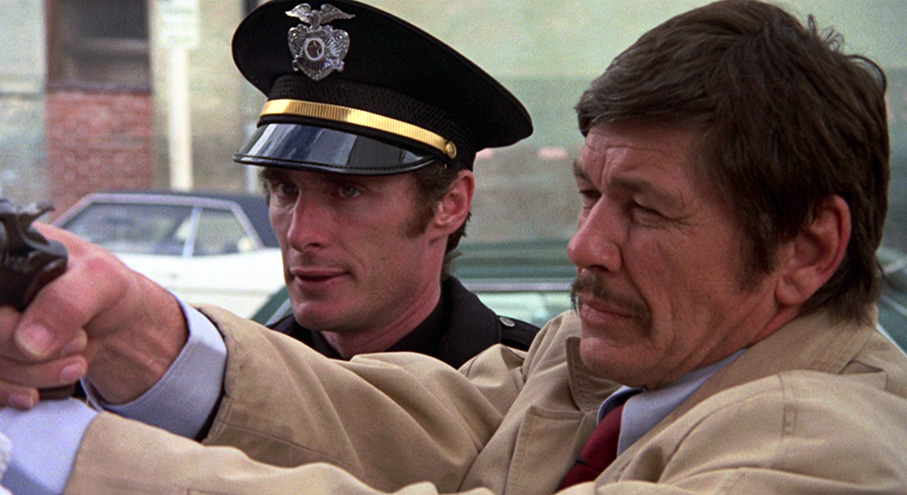
Between The Mechanic and Death Wish, Winner and Bronson collaborated on the 1973 The Stone Killer. In this, Bronson plays New York police detective, Lieutenant Lou Torrey. Torrey is the sort of bullish 70s cop who rolls up at a crime scene and strides into a building in which an agitated Puerto Rican teen is waving a gun, then chases him outside and shoots him dead. Well the kid did shoot a cop when a liquor store robbery went sour. Hmm. This makes three teens killed by the cops in four weeks, the TV news informs us. In the very next scene, Torrey is handing in his badge and his gun and I'm OK with that. He then assures his pathologist sister that he tried to talk the boy down before shooting him, but in my book, shouting "You still got two ways to build it, kid!" up the stairs after the first exchange of gunfire doesn't really qualify.
Presumably for a change of scenery, Torrey accepts a posting in Los Angeles. Here, he continues flirting with hypocrisy by chastising a fellow officer for his redneck racism during the brutal arrest of a black drug dealer, then a short while later refers to an African-American suspect as "a spade." As you can probably imagine, Torrey is not the easiest man to warm to. After a couple of vicious punches and a threat that revolves around the drug dealer's status as a black man in a racist world, the man fingers ageing addict Armitage (Eddie Firestone), a former heavy hitter for the Mob whose best days are way behind him. When they get Armitage back to the station, it turns out that he's wanted for murder back in New York. Want to guess which detective is assigned to deliver him? Say what you like about Winner, but he doesn't hang around – when Torrey and Armitage land back in the Big Apple, over two years have passed since that opening scene and we're not even ten minutes into the movie.
The agitated Armitage tries to convince the disinterested Torrey that he has valuable information on a man named Wexton and an upcoming job and suggests that the cops would do well to take care of him. As if to hammer home the validity of his claim, Armitage is shot and killed from a passing car as they exit the airport building. While a curious Torrey begins digging into who this Wexton might be, local Sicilian Mafia kingpin Al Vescari (played by Martin Balsam, who here is sporting a rather suspect Sicilian accent) sets a plan to put his rivals out of business into motion, and an ex-Vietnam soldier named Gustav Lipper (David Moody) is freed from police custody by freelance hitman Alfred Langley (Paul Koslo), then is very publicly shot to death by Langley's accomplice. Just what has Torrey inadvertently stumbled onto here?
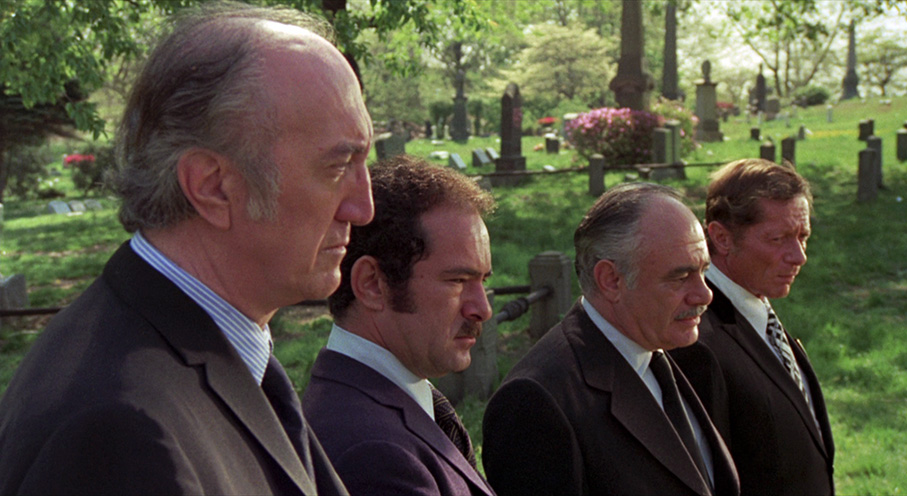
This is, it has to be said, an interesting setup, but it's only when I wrote it down that I really appreciated this. For me at least, a key barrier to engagement from the off is Torrey himself, a cheerless plod who expresses liberal-leaning sentiments about those who live in the broken-down communities he polices, but whose favoured method of interrogation involves intimidation and/or physical beatings. This, of course, was post-Dirty Harry and post-French Connection American crime cinema, and maverick, rule-breaking cops with fascistic leanings were very much in vogue. But as played by the often glumly monotone and stone-faced Bronson, Torrey has neither the iconic cool of a Harry Callahan or the obsessive drive and twitchy energy of a Popeye Doyle. That said, Gerald Wilson's functional but wit-free screenplay (which is adapted from a novel by John Gardner that I have not read) doesn't give him that much to work with. The plot lacks the obsessive drive of The French Connection or the arresting conspiracy twists of the later L.A. Confidential, and in the end it boils down to an investigation into two shootings that uncovers a plan to shoot more people and comes to a head with just about everyone shooting at each other.
There's never any real sense that Torrey himself is at risk, even when he and his colleagues go against the mob boys for a pair of noisy and intermittently confusing climactic shoot-outs. Then again, as a killer of bad guys Torrey is a bit like a crumpled Terminator, taking out just about everyone he shoots at with a maximum of two rapidly fired and always lethal shots. He even gets his man with his signature two bullets when firing from the doorway of a rapidly moving helicopter without taking anything approaching careful aim. Only twice does he miss, in both cases so that he can chase his target into another room or a stairwell and shoot them from a more interesting angle. Given that his colleagues can't seem to shoot for toffee, it's perhaps not such a stretch that his bosses cut him some serious slack. That said, when he ploughs his car headlong through a string of market stalls, fences and shop windows in pursuit of a suspect in one of the film's more generically entertaining scenes, I can't be the only one who raised an eyebrow when the only complaint against him was that he used his vehicle as a weapon to bring the man down.
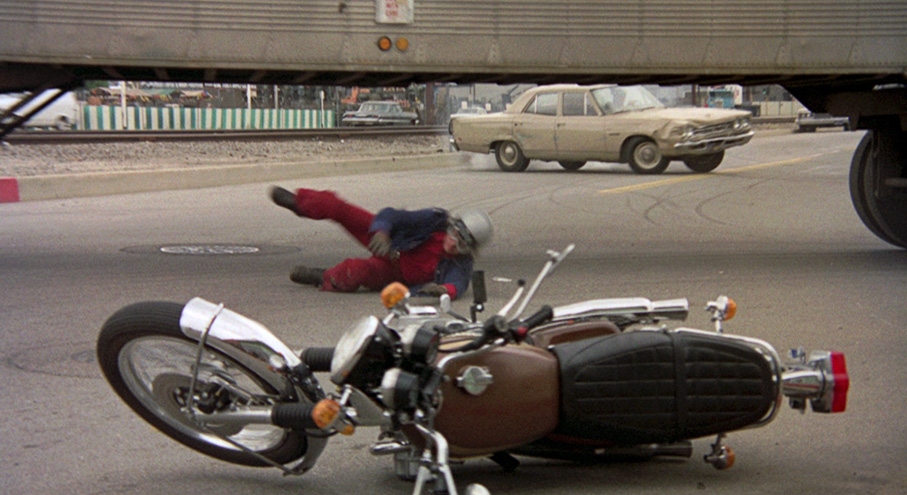
The Stone Killer is never flat-out dull, but it's never really tense or exciting either. Winner seems to direct on a scene-by-scene basis with little real concern about how sequences are supposed to flow into each other or work as a collective whole. Within that constraint there are certainly some pleasures, several of which lie in the director's eye for casting the supporting roles. My favourite here is Paul Koslo's strangle-haired Langley, a cheery freelance operator whose love of jazz trombone is an interesting character trait that ultimately leads to his undoing. Every bit as entertaining is Walter Burke's offbeat role as ageing, diminutive and gravel-voiced drug dealer J.D., who unloads his various drugs for the detectives with a real sense of pride about the quality of his product.
The Stone Killer is a workmanlike crime thriller that I couldn't find much enthusiasm for, even after two consecutive viewings and two further mute ones to listen to the commentary track and Winner interview detailed below. It plays almost slavishly to my long-held prejudicial expectations for a Winner/Bronson collaboration, and while kept afloat by some interesting character detail and an often brisk pace, it fails to make much of an impression as a whole. That elements have dated is par for the course given the year and country of the film's production, though special mention should go to the hippy female who offers to sleep with Torrey just seconds after meeting him, while her spaced-out colleagues gyrate wildly in the background in the sort of ashram groove that probably only ever existed in the mind of middle-class filmmakers. Perhaps the biggest dropped ball is a potentially interesting subtext about how the Vietnam war has transformed a whole generation of former soldiers into potential killers-for-hire, a concept compelling explored in the recent mini-series Quarry but is here reduced to a couple of lines of throwaway dialogue. If you're a fan of either Winner or Bronson or both, then you may well get a lot more out of this particular film than I did. I got what I was expecting, but having rather enjoyed Winner and Bronson's previous collaboration, The Mechanic, I guess I was secretly hoping for something more.
Sourced from an HD master by Sony, the 1.85:1 transfer here is a solid presentation of a film that doesn't go out of its way to be visually attractive – on the commentary track, Nick Pinkerton highlights one scene as having the worst lighting of an African-American character he's ever seen, and he's not wrong. There's an earthy tone to many of the interiors that's typical of American films of the period, but outside when the light is good the colour is impressively naturalistic, and when brighter colours appear – the ashram parrot is a good example – they shine. The contrast is nicely balanced, the litmus test being the night-time exteriors, where the black levels are nailed without sacrificing sacrifice picture detail. The image is consistently crisp with a fine film grain visible and no trace of dust or damage.
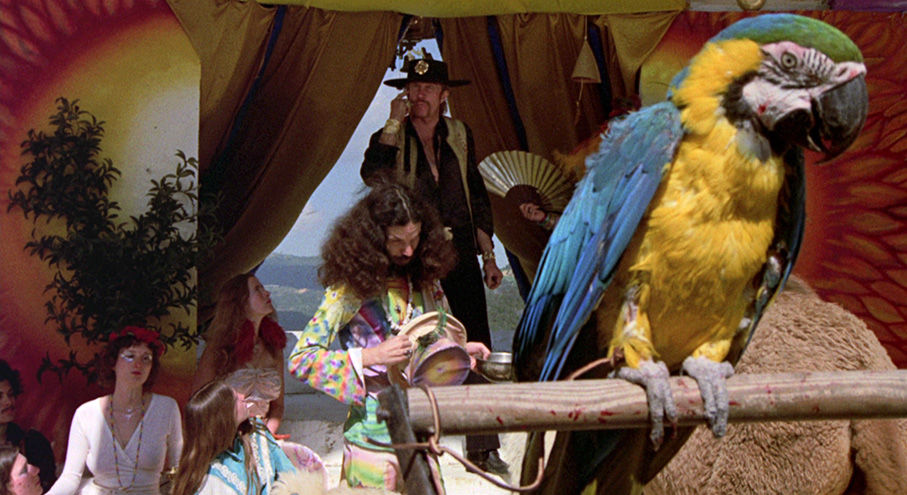
The linear PCM 1,0 mono track has the expected limits on the dynamic range (no chest-rumbling bass here), but the dialogue, music and effects are all clear and there is no damage or background hiss to contend with.
Optional English subtitles for the deaf and hearing impaired are included.
Audio Commentary
I'll admit that I was a tad apprehensive about sitting down for this commentary by film journalist and programmer Nick Pinkerton, in spite of his excellent writing elsewhere, as I always find it a bit of a slog to listen to someone consistently praising a film that I've struggled to get much out of. I needn't have worried. Pinkerton's contribution here is brimming with interesting facts and observations about the film and its making, and includes quotes from reviews and Winner's autobiography, information on almost every actor who has more than one line of dialogue and the locations in which scenes were shot. Intriguingly, he turns out to be as unsure about the film and Winner as a filmmaker as I am, a synchronicity of viewpoints that is cemented when he says that The Mechanic "is generally given a pass by even those of us who have some serious doubts about Michael Winner." Twice I laughed out loud at his dryly delivered comments, firstly when he pauses to outline Charles Bronson's career in enthralling detail because, "nothing terribly interesting is going to happen for the next five minutes or so," secondly when he says of the scene when Martin Balsam outlines his plan, "I tend to glaze over here." He does credit the film for the things it does well – I'm in complete agreement about the quality of the dummies used for spectacular falls – but is equally comfortable criticising its failings. A hugely enjoyable track.
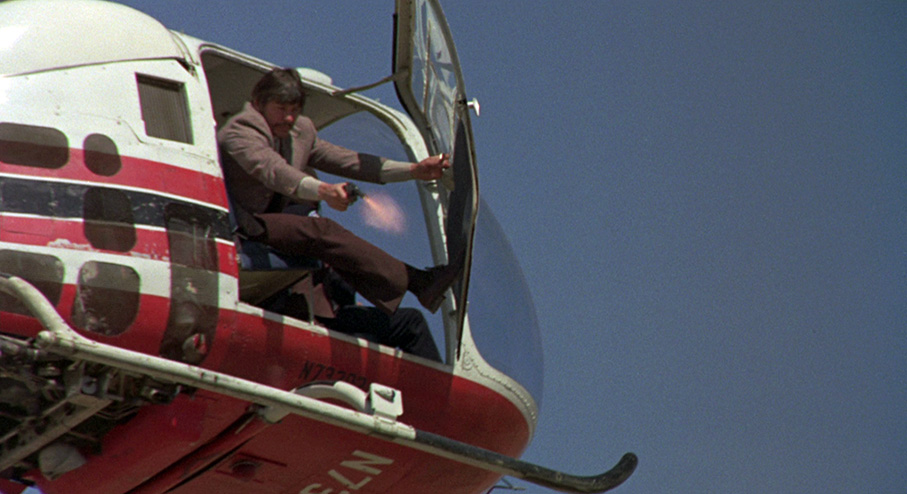
Mr. Blonde (17:04)
Given that Paul Koslo's performance was one of the film's real pleasures for me, I was chuffed to discover that he's the only one connected with the film who's been interviewed for this disc. He provides info on his early acting career, explains why he chose to bleach his hair blonde for the role of Langley and how he drew on the location in which they were shooting to develop the character. He also recalls his fractious first encounter with Winner, whom he attempts to impersonate (those with an aversion for strong language will need to plug their ears up here) with an unfortunately Australian sounding English accent. His on-set stories make Bronson, with whom he did not get on, sound like a bit of a dick, though they apparently did settle their differences later.
The John Player Lecture with Michael Winner (64:53)
I was also a little nervous about sitting down for this, but as with the commentary, I was surprised how much fun it was to listen to. Winner himself here is a ball of almost uncontrolled bullish energy and begins by taking the term ‘lecture' literally, talking at high speed for 20 minutes straight about his early career and introducing clips from a number of his films. And it's entertaining, informative and often very funny. Eventually he pauses long enough to respond to questions from critic Margaret Hinxman and later the audience, and even helps us out by summarising questions that are difficult to hear before answering them. Due to the sheer speed at which Winner talks, there's a ton of stuff covered here, including his preference for shooting on location, his attraction to the theme of society turning on itself, working with big stars who have the power to influence key elements of the film and even fire the director, his dislike of producers, and loads more. He confirms a love of Luis Buñuel films ("he's streets ahead of everybody"), cites Kes as one of the few great and successful (then) recent British movies, and tells an amusing story about gazumping Howard Hawks on a key filming location. Recorded in 1971 just after the completion of Lawman, it's an audio-only piece that runs as a second commentary track and has its share of small audio issues, but the content is well worth tolerating this for.
Isolated Score
None of us at Outsider are huge enthusiasts for these extras – the sometimes sizeable gaps between the musical passages can be a chore to sit through – and given that I'm not a fan of Roy Budd's score for this particular film, I can't really win here. The audio quality is good, however.
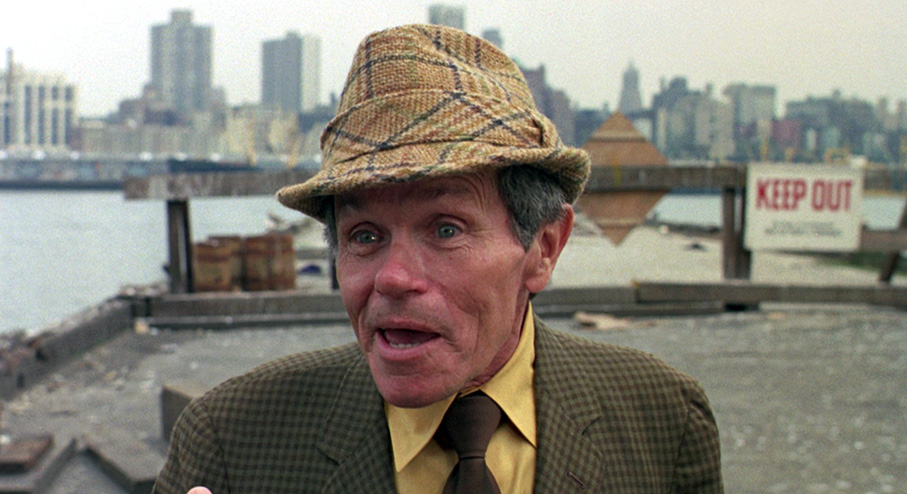
Theatrical Trailer (2:13)
A fast-cut trailer that sells the film as a non-stop series of explosive action scenes and angry confrontations. I'm not convinced.
Image Gallery
73 manually advanced slides of original promotional material and some interesting behind-the-scenes imagery from Michael Winner's personal collection. The quality of the scans is consistently high.
Booklet
More good stuff here. Following the expected two-page spread of film credits, there's a detailed essay on the film's conception, production and release by Paul Talbot, one that opens by reminding me of those bloody "calm down, dear" commercials that Winner directed and appeared in for some car insurance company or other towards the end of his career. This is followed by an extract from Winner's autobiography – modestly titled Winner Takes All – in which he discusses making the film, and extracts from a piece by Roger Ebert for Esquire in which Winner and Bronson talk about working with each other. After this, we have a collection of quotes from Winner and some positive remarks about him from name actors, all taken from a brochure that accompanied the John Player lecture with Winner that appears on this very disc. We then have a number of extracts from contemporary reviews of the film, some of which have nicer things to say about it than I did. As ever, it's all a worthy read.
What more to say? I've a fondness for 70s cop and crime thrillers, but this one did little for me. If this is your bag, then Indicator have once again delivered on the quality of the transfer and the included special features. For that, I can recommend this dual format release. If by some chance you enjoy the film itself more than I did, you'll likely be well happy with this release.
|